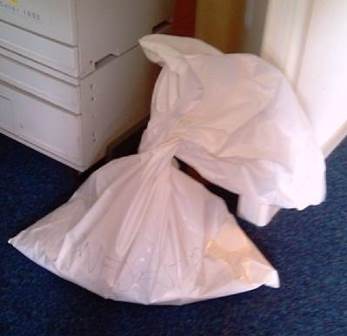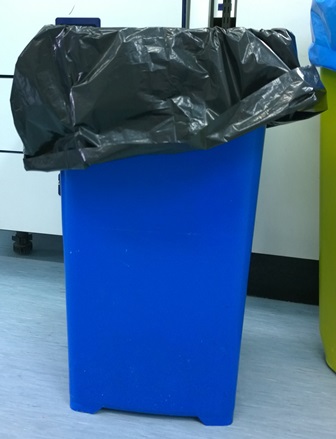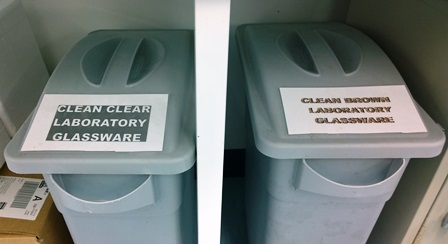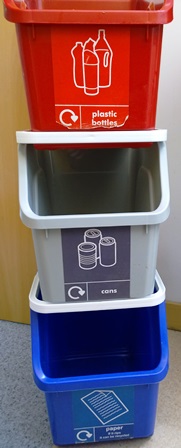- Definition
- Paper
- Catalogues
- Food and its Packaging
- Cardboard
- Polystyrene Packaging
- Toner Cartridges
- Glass Items
- Crockery
- Mini Recycling Stations
- Recyclable Items
- Local Recycling Schemes
Ask your Lab Manager for assistance if you are unable to find the necessary information. If there is any doubt about the correct disposal method, Lab Managers should consult SLS Health & Safety.
General Waste Poster
Take a look at our General Laboratory Waste Poster for some basic guidance on waste disposal in general research laboratories.
1.Definition of General Waste
The type of waste generated by standard office activities is classed as general waste. It primarily consists of waste paper and packaging. In offices and the general laboratories, general waste is usually removed by the Early Morning Cleaners. In the Tissue Culture suites, it is removed by the CTS Technicians. In order to protect the staff handling general waste it must not contain:
- contaminated lab ware, waste chemicals or other hazardous waste; any sharp items that may create a risk of scratches, cuts or puncture wounds – i.e. true sharps, plastic pipette tips or large plastic pipettes, even if they are uncontaminated;
- heavy items that may constitute a manual handling hazard.
Note: Combustible waste must not be stored in corridors or staircases that constitute part of a fire escape route
2. Paper
2.1 Recyclable Paper

Recyclable paper - e.g. delivery notes, newspapers, magazines, mail-shots/fliers, printer/photocopier paper, envelopes without windows, paper hand towels - should be deposited into green plastic bags. These can be found by most photocopiers and, in the case of those used solely for paper hand towels, next to wash-hand basins. Additional bins/bags are available from Domestic Services. Cardboard, laminated paper/covers/jackets, heavy catalogues/books/directories, ring binders/lever-arch folders, envelopes with windows, plastic wrappers and any other non paper items - e.g. plastic cups/bottles, food debris, drinks cans - must not be placed in the green bags. Do not fill green bags to the point where they may become a manual handling hazard. If you cannot comfortably lift it, the bag is too heavy. Note - reuse of envelopes is preferable to disposal.
2.2 Confidential Paperwork

Confidential paperwork should be shredded before disposal. Please check with your Lab Manager as to where your nearest shredder is located. Shredded paper waste can be treated as recyclable paper. If confidential paper waste cannot be shredded, it must be sealed in white bags and uplifted by E&B for incineration. Do not fill white bags to the point where they may become a manual handling hazard. If you cannot comfortably lift it, the bag is too heavy.

2.3 Non-recyclable Paper
Paper waste that does not fall into either of the two previous categories should be disposed of to bins lined with black plastic bags.
3. Heavy Catalogues and Books
Catalogues and books must be collected into green plastic bags. Ensure bags are appropriately labelled to prevent cleaners uplifting them along with other green bags. Laminated covers must be removed and disposed of separately, i.e. into black bags. Do not fill green bags to the point where they may become a manual handling hazard. If you cannot comfortably lift it, the bag is too heavy. Once full, seal and arrange for uplift by E&B.
4. Food and its Packaging
Food and its packaging may be disposed of into bins lined with black plastic bags in offices,
meeting rooms or coffee rooms, but not in laboratory areas.
Recyclable food/drink packaging may be disposed of at the mini recycling stations. 
5. Cardboard
Cardboard packaging must be flattened and stacked neatly at designated collection points. Check for metal staples and remove these carefully with pliers before flat-packing. The SLS Stores Personnel remove waste from these points to the waste store in the JBC basement. E&B arrange for the final uplift and recycling of cardboard waste.
6. Polystyrene Packaging
Reuse polystyrene packaging whenever possible or take advantage of any recycling service offered by the original supplier. (Note: this is usually done via the normal mail route rather than Stores.) If neither of these is an option, small polystyrene items should be deposited in a bin lined with a black plastic bag and larger items should be left at a cardboard collection point.
7. Toner Cartridges
Return to the original supplier using their packaging and labels or package securely and deposit in the WTB Stores loading bay for uplift by Supplies Team. Note: this does not apply to inkjet cartridges.
8. Glass Items
Please Note: Glass bins are not for the disposal of crockery.
8.1 Lab Glass
If the original supplier collects and recycles glass items (e.g. VWR and Fisher will collect winchesters - rinsed, dried and repackaged - from WTB Stores) this service should be utilised. Otherwise, waste lab glass items, whole or broken, should be deposited in an appropriate lab glass bin. Lab glass bins must be plastic and come with a lid and wheeled based (e.g. Slim Jim Recycling Bins from Arco; cat. no. 5568800; lid and wheeled trolley sold separately) for ease of transport to the outdoor glass bins at the west end of MSI. SLS Porters are responsible for emptying lab glass bins as and when required. Glass disposed of via this route must be clean and uncontaminated, i.e. free from hazardous chemicals, biological material, radioactive material and other debris. Glass must be segregated by colour.
8.2 Non Lab Glass
Disposal of non lab glass is the responsibility of the person(s) generating the waste, or in the case of social gatherings, the person organising the function. If the original supplier collects and recycles glass items this service should be utilised, e.g. Aitkens Wines will uplift bottles originally supplied by them when they come to uplift wine glasses after a function. Otherwise, non lab glass waste must be safely packaged and transported to an appropriate glass recycling point, e.g. a green glass bin in a meeting/coffee room* or the outdoor bins at the west end of MSI. Glass disposed of via this route must be clean and uncontaminated, i.e. free from food, drink and other debris. Glass must be segregated by colour. *Green glass bins may be made available in coffee/meeting rooms at the discretion of the Division Head. The relevant Lab Manager is responsible for ensuring the green glass bins are emptied safely and as required. Green glass bins must not be located in lab areas.
9. Crockery
Crockery must be carefully packaged so as to prevent the possibility of injury to personnel handling the waste sacks, labelled as waste crockery and deposited by a bin lined with a black plastic bag. It will then be removed by the Early Morning Cleaner. Note; glass bins are not for the disposal of crockery.

10. Mini Recycling Stations
Mini recycling stations, as shown on the right, are located in coffee rooms/kitchen areas for collecting recyclable food/drink packaging. Containers should be rinsed/washed out then streamed as the labels on the bins indicate, i.e.
- plastic bottles/cups into the red bin;
- metal cans into the grey bin;
- paper into the blue bin.
11. Recyclable plastics

If the original supplier collects and recycles glass items this service should be utilised. Starlabs collects empty tip boxes and VWR collects various chemical containers from WTB Stores on a regular basis. Tip boxes must be free from contamination and packaged in the bags supplied by Starlabs. Chemical tubs must be thoroughly rinsed/washed out, dried and packed into heavy duty, clear plastic bags (available from Stores). More information about this recycling scheme can be found here.
Other recyclable plastic items can be collected into heavy duty, clear plastic bags and taken to the waste holding room in the JBC basement. The bags are removed by E&B then passed to the local Council for recycling. The following types of plastic can be recycled via this route:
- type 1: PETE/PET/Polyethylene Terephthalate/Polyester;
- type 2: HDPE/High Density Polyethylene;
- type 4: LDPE/Low Density Polyethylene;
- type 5: PP/Polypropylene;
- type 6: PS/Polystyrene but NOT the expanded type used for packaging.
Containers must be thoroughly rinsed/washed out before depositing into the clear plastic bags.
Note: type 3 plastic (PVC/Polyvinyl Chloride), plastic shopping bags/bin liners and expanded polystyrene packaging cannot be recycled via this route.
12. Local Recycling Schemes
Certain groups within SLS operate their own local recycling schemes. The relevant Laboratory/Office Manager is responsible for policing such schemes and ensuring waste is safely stored, correctly disposed of and not accumulated on SLS premises for any longer than is absolutely necessary. SLS Health & Safety encourages and supports recycling initiatives, but reserves the right to terminate local recycling schemes if they are not effectively policed or if any aspect is deemed to present an unacceptable risk to personnel.




